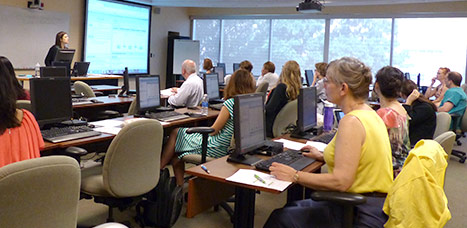New App Provides “Safe-Harbor Sandbox” for Researchers to Delve Into Clinical Data

Researchers who would like to explore the depths of health care information contained within the Carolina Data Warehouse for Health now have a safe and easy way to test the waters with a new tool called i2b2. The application enables investigators to play around with a stripped down version of UNC Health Care data, testing the feasibility of clinical trials or retrospective studies before diving in further.
The Carolina Data Warehouse for Health (CDW-H) is a data federation of electronic medical records from UNC Health Care that brings together patient care and clinical research. It contains a wealth of information — from patient admissions data to lab results to radiology images — on more than three million individual patients. Typically, researchers who want to tap into this data to support grant applications or launch clinical studies need to put in a formal request, a process that can take days or even months.
“One of the most common problems that researchers face is trouble with recruitment and finding a large enough patient population for their study,” said Robert Bradford, an applications specialist and developer of i2b2. “This issue often stems from not having access to accurate cohort numbers at the very beginning of a study when submitting grants and proposals. In the past, even obtaining a cohort count for a study was locked behind involving a CDW-H analyst with an uncertain time to response. Now, with i2b2, researchers can do this discovery with their own hands and get the answer they need in minutes.”
i2b2 stands for “Informatics for Integrating Biology and the Bedside” and refers to the i2b2 Center, an NIH Funded National Center for Biomedical Computing based at Partners HealthCare System. The i2b2 software was originally created by this group, but is being employed at research institutions in the United States and Europe.
“Researchers using i2b2 don’t have to navigate the same technical or regulatory hurdles that can slow down access to CDW-H because the tool only contains data that has been deidentified and aggregated,” said Kellie Walters, program coordinator for the North Carolina Translational and Clinical Sciences (NC TraCS) Institute. “Essentially, i2b2 removes personal information that researchers are not supposed to see, providing a kind of safe-harbor sandbox where they can play around and investigate areas that they might not have otherwise explored.”
Once researchers are finished exploring, they can acquire regulatory approval and connect with a CDW analyst to get additional information about specific cohorts of patients for their studies.
The North Carolina Translational and Clinical Sciences (NC TraCS) Institute, along with the Research Hub at the Health Sciences Library, provides in-person training sessions to introduce users to i2b2 and teach them how to get the most out of the new application. Each session goes over the basics, explaining what kind of data are available, demonstrating how to build a query, and showcasing advanced functions of i2b2. More than 250 people have attended these training sessions, which began in March.
Among those who have benefited from this training is Stefanie Twist, center coordinator for the UNC Center for Function GI and Motility Disorders. Twist has used i2b2 to identify patient populations at local hospitals who had a diagnosis of fecal incontinence.
“It is wonderful to have real-time analysis of the patient populations,” said Twist. “This type of analysis has certainly expedited our ability to examine patient cohorts.”
Researchers who would like to access i2b2 must first attend one of the training sessions, which are held at least once a month. To learn more about the new application or register for training, just visit tracs.unc.edu/i2b2.
- Created on .